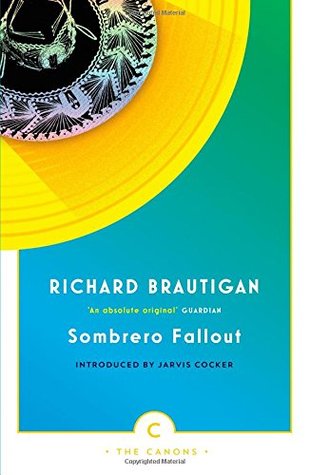But as the man searches through his apartment for strands of his lost love's hair, the discarded story in the wastepaper basket - through some kind of elaborate origami - carries on without him. Arguments over the sombrero begin, one thing leads to another and before long all hell breaks loose in the normally sleep town.
Brautigan's fertile imagination twists and pulls at the ensuing chaos to come up with a tender, moving, surreal and incredibly funny tale that is told by a writer at the very peak of his creative powers.
Goodreads description
Yukiko rolled over.
That plain, that simple.
Her body was small in its moving.
And her hair followed, dreaming her as she moved.
A cat, her cat, in bed with her was awakened by her moving, and watched her turn slowly over in bed. When she stopped moving, the cat went back to sleep.
It was a black cat and could have been a suburb of her hair.
MEANWHILE BACK IN the waste-paper basket -- what a way to start a chapter! And what is happening in the paper basket? The story discarded by the central character has decided it will continue without him. This is a magic realist story on both levels. It is metafiction and it contains a magical sombrero. What more could you want from a magic realist book?
I had been meaning to read some Brautigan as part of my magic realism challenge and then the opportunity to review this new edition by Canongate (with introduction by Jarvis Cocker, which you can read if you follow the link below) came up and I jumped at it. I am delighted I did - I love this book. It is a joy from start to finish.
I am not sure what I was expecting. I rather had Brautigan down as some hippy author and suspected that his magic realism would be whimsical. Indeed I have seen it described as such, but it isn't, not by my definition anyway. This book is funny, but it is also sad. The central character, a humourous fiction author with no sense of humour, is devastated by the loss of his Japanese lover. The poor woman has finally fled this relationship with a man who is so complex that he ties himself into knots over whether to eat a tuna sandwich (even though he has no tuna). She was never going to go out with another
writer: no matter how charming, sensitive, inventive or fun they could
be. They weren't worth it in the long run. They were emotionally too
expensive and the upkeep was complicated. They were like having a vacuum
cleaner around the house that broke all the time and only Einstein
could fix it.
She wanted her next lover to be a broom.
She wanted her next lover to be a broom.
Whilst her former lover obsesses about whether to ring her, imagining what she would say and that she is in the arms of another man, she is asleep and dreaming. The book shifts from the author to the woman and then into the story developing in the waste-paper basket. Nothing much happens in the "real life" stories: the writer is paralyzed by his revolving thoughts, the woman is simply sleeping, but Brautigan draws a brilliant picture of a relationship that is going nowhere.
Brautigan's writing style is so economical and yet so beautiful that it reminds me of Japanese haiku:
Yukiko rolled over.
That plain, that simple.
Her body was small in its moving.
And her hair followed, dreaming her as she moved.
A cat, her cat, in bed with her was awakened by her moving, and watched her turn slowly over in bed. When she stopped moving, the cat went back to sleep.
It was a black cat and could have been a suburb of her hair.
That piece is one chapter in the book. Yes, a chapter. But what more is there to say?
Meanwhile back in the waste-paper basket the story is moving forward. The arrival of the frozen sombrero out of a blue sky starts a train of dramatic events: The crowd was becoming larger and more active... They were proceeding on schedule step by step down the path that would end with them battling Federal troops and cause their small town to be plunged into world focus. It wouldn't be long now. The comparison between the dynamic arc of the story, with its series of causes and effects, and the stasis in the life of the humourist is marked. Is this the difference between fiction and reality? But then the story of the humourist is also fictional.
But what about the sombrero? It's still there, lying in the street... How can you miss a very cold white sombrero lying in the Main Street of a town?
In other words: There is more to life than meets the eye.
Indeed there is. Wonderful!
I am very grateful to the publisher, Canongate, for allowing me to read this book in return for a fair review. It has been one of the highlights in my career as a reviewer.
Related articles

No comments:
Post a Comment